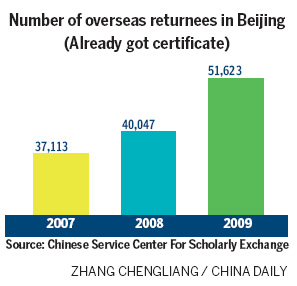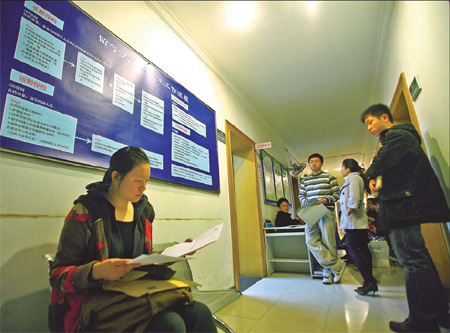Top Stories
'Sea turtles' swimming back in larger numbers
By returnees (China Daily)
Updated: 2010-03-30 07:53
 |
Large Medium Small |
|
Returnees queue at the Beijing Overseas Talents Center. Zou Hong / China Daily |
Students return to the capital because of betteropportunities
The number of overseas returnees in Beijing last year increased by 15,000, a 28 percent rise compared with 2008, according to the deputy director of the Chinese Service Center for Scholarly Exchange.
"The center gave 37,113 people an overseas returnee certificate in 2007, the number rose to 40,047 in 2008 and last year it exceed 51,600," Yu Haiying from the center told METRO.
The number of overseas returnees in Beijing has increased by about 10,000 in each of the last three years.
According to Li Gang from the Beijing Overseas Talents Center, this may be because the Beijing government introduced a series of favorable policies to encourage overseas returnees (often referred to as "sea turtles" in China) to work in Beijing-based companies or start their own businesses in Beijing.
These policies include providing temporary accommodation, a tax deduction for buying a car and priority in getting a Beijing hukou (residence certificate).
"Almost all the returnees who get certificates in Beijing intend to work in this city," Yu said.
According to Yu, those who get certificates from the center are mostly non-local students who finished their undergraduate studies in Beijing and then go abroad to get a higher degree. "Every day there are long lines in the corridor; we had to buy a machine to print out numbers to help us serve all the returnees," said Yu.

Most of the returnees are master's degree holders from English-speaking countries such as the United Kingdom, the United States and Australia. More than 12, 000 of the 2009 returnees studied in the UK, 5,000 studied in Australia, more than 3,000 studied in Japan and more than 3,000 studied in the US, according to Yu.
"We do have some 'senior sea turtles' who got doctoral degrees abroad and we also have 'junior sea turtles' who earned bachelor's degrees at overseas universities," said Yu.
But Yu said the "senior and junior sea turtles" are just a small portion, because "the chances of those with doctoral degrees getting a well-paid job in a foreign country are good, so many of them choose to stay overseas; while those with a bachelor's degree know they will have a hard time finding a decent job in China, since there are so many master's degree holders here, so they also choose to stay abroad."
According to the Ministry of Education, 229,300 students went abroad in 2009, 210,100 of them at their own expense. In 2009, the number of returnees in China reached 108,300, an increase of 56 percent compared with 2008.
"These days science- and technology-related majors are no longer the most popular choices, instead more than half of Chinese students who study overseas choose practical majors such as economics, business management, law or other areas related to social sciences," said an official at a 2010 China International Education Exhibition Tour press conference.
| ||||
Jin said most of her friends believe that they have a better chance of starting a successful career in China.
"We lack the cultural background and language advantage that native people have overseas, so it is better to return to China," Jin said.









